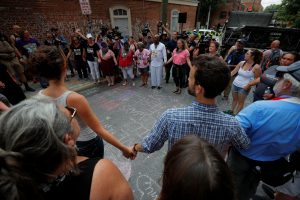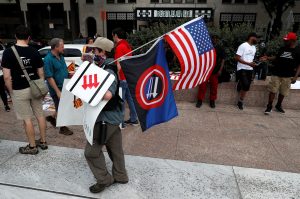
By Ginger Gibson and Jonathan Landay
WASHINGTON (Reuters) – A white nationalist rally in the heart of Washington drew two dozen demonstrators and thousands of chanting counterprotesters on Sunday, the one-year anniversary of racially charged violence in Charlottesville, Virginia.
A large police presence kept the two sides separated in Lafayette Square, in front of the White House. After two hours and a few speeches, the “Unite the Right 2” rally ended early when it began to rain and two police vans took the demonstrators back to Virginia.

Demonstrators hold hands at the site where Heather Heyer was killed, on the one year anniversary of 2017 Charlottesville “Unite the Right” protests, in Charlottesville, Virginia, U.S., August 12, 2018. REUTERS/Brian Snyder
Sunday’s events, while tense at times, were a far cry from the street brawls that broke out in downtown Charlottesville a year ago when a local woman was killed by a man who drove his car into a crowd of counterprotesters.
“Unite the Right 2” had been denied a permit in Charlottesville this year but did secure one for Washington. Organizers had planned for up to 400 protesters.
At the head of the white nationalist group was Virginia activist Jason Kessler, who helped organize last year’s event in Charlottesville. He emerged with a handful of fellow demonstrators from a subway station holding an American flag and walked toward the White House ringed by police, while counterprotesters taunted the group and called them Nazis.
Dan Haught, a 54-year-old computer programmer from Washington, was attending his first protest at the White House holding a sign that said: “Back under your rocks you Nazi clowns.”
“We wanted to send a message to the world that we vastly outnumber them,” Haught said.
Police said that as of 6 p.m. ET (2200 GMT) they had made no arrests and would not give a crowd estimate. Late in the day, a small group of counter-protesters clashed with police in downtown Washington.
The violence last year in Charlottesville, sparked by white nationalists’ outrage over a plan to remove a Confederate general’s statue, convulsed the nation and sparked condemnation across the political spectrum. It also was one of the lowest moments of President Donald Trump’s first year in office.
At the time, Trump said there were “very fine people” on both sides, spurring criticism that he was equating the counter-protesters with the rally attendees, who included neo-Nazis and other white supremacists.
On Saturday, Trump condemned “all types of racism” in a Twitter post marking the anniversary.

People gather at Freedom Plaza to protest the white supremacist Unite the Right rally held in front of the White House on the one year anniversary of the white nationalist rally in Charlottesville, VA, in downtown Washington, U.S., August 12, 2018. REUTERS/ Leah Millis
ANTI-FASCISTS AND FAMILIES
Kessler said Sunday’s rally was aimed at advocating for “free speech for everybody,” and he blamed last year’s violence in Charlottesville on other groups and the media.
He thought Sunday’s rally went well in comparison.
“Everybody got the ability to speak and I think that was a major improvement over Charlottesville,” Kessler told Reuters. “It was a precedent that had to be set. It was more important than anything.”
The counterprotest which began earlier in the day was a smattering of diverse groups – from black-clad anti-fascists to supporters of the Black Lives Matter movement to families who brought children in strollers. Tourists took pictures and both protesters and observers zoomed around on electric scooters.
Sean Kratouil, a 17-year-old who lives in Maryland, was wearing a vest with “Antifa” on the back and said he was there to help start a movement of peaceful anti-fascists. He said he was concerned that when rallies turn violent, it makes his side look bad. “Public perception is key,” he said.
In the picturesque college town of Charlottesville, hundreds of police officers had maintained a security perimeter around the normally bustling downtown district throughout the day on Saturday. Vehicular traffic was barred from an area of more than 15 city blocks, while pedestrians were allowed access at two checkpoints where officers examined bags for weapons.
Hundreds of students and activists took to the streets on Saturday evening. Many of the protesters directed their anger at the heavy police presence, with chants like “cops and Klan go hand in hand,” a year after police were harshly criticized for their failure to prevent the violence.
On Sunday morning, activist Grace Aheron, 27, donned a Black Lives Matter T-shirt and joined hundreds of fellow Charlottesville residents who gathered at Booker T. Washington Park to mark the anniversary of last year’s bloodshed.
“We want to claim our streets back, claim our public space back, claim our city back,” Aheron said at the park.
Charlottesville authorities said four people had been arrested on Sunday.
(Reporting by Ginger Gibson and Jonathan Landay in Washington; Additional reporting by Joseph Ax in Charlottesville and David Shepardson and Michelle Price in Washington; Writing by Dan Wallis and Mary Milliken; Editing by Grant McCool, Cynthia Osterman, and Susan Thomas)
